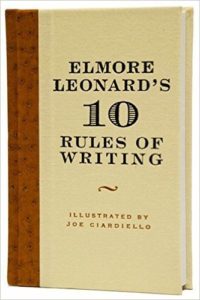Elmore Leonard’s 10 Rules of Writing
Elmore Leonard, one of America’s recognized masters of thriller/suspense fiction, primarily in the crime genre, wrote a piece for a New York Times column, “Writers on Writing,” in July 2001.
He since published it in book form as Elmore Leonard’s 10 Rules of Writing, which you can get here on Amazon.
Leonard got his start by scraping out a living writing short stories and westerns (one of which, Valdez is Coming, is now considered a classic of the genre). He grew up in the Detroit area, and it’s only natural that he transitioned to writing crime fiction, where he displayed an unmatched virtuosity in capturing authentic street characters and slang in his novels.
Over 20 of his stories have been made into movies or TV shows. Westerns: Hombre and Joe Kidd, starring Paul Newman and Clint Eastwood, respectively, and more recently 3:10 to Yuma starring Russell Crowe and Christian Bale. Crime: Get Shorty starring John Travolta and Gene Hackman; Out of Sight starring George Clooney and Jennifer Lopez; Killshotstarring Mickey Rourke and Diane Lane; the FX series Justified starring Timothy Olyphant; and so on.
Leonard didn’t achieve that kind of success because he was lucky; he earned his chops the hard way, from the ground up, and as he says about his little book: “These are the rules I’ve picked up along the way to help me remain invisible when I’m writing a book, to help me show rather than tell what’s taking place in the story.”
Anyone who writes fiction, or aspires to, will benefit from the advice based on his experience.
Here it is in summary form:
1. Never open a book with weather.
2. Avoid prologues.
3. Never use a verb other than “said” to carry dialogue.
4. Never use an adverb to modify the verb “said” . . .
5. Keep your exclamation points under control.
6. Never use the words “suddenly” or “all hell broke loose.”
7. Use regional dialect, patois, sparingly.
8. Avoid detailed descriptions of characters.
9. Don’t go into great detail describing places and things.
10. Try to leave out the part that readers tend to skip.
I encourage you to read what he has to say about each of those rules, sparing as it is.
I keep a hardcover copy in my living room so I can read it from time to time. I find it always helps keep me on track.






 SIGN-UP TO BE AN INSIDER
SIGN-UP TO BE AN INSIDER